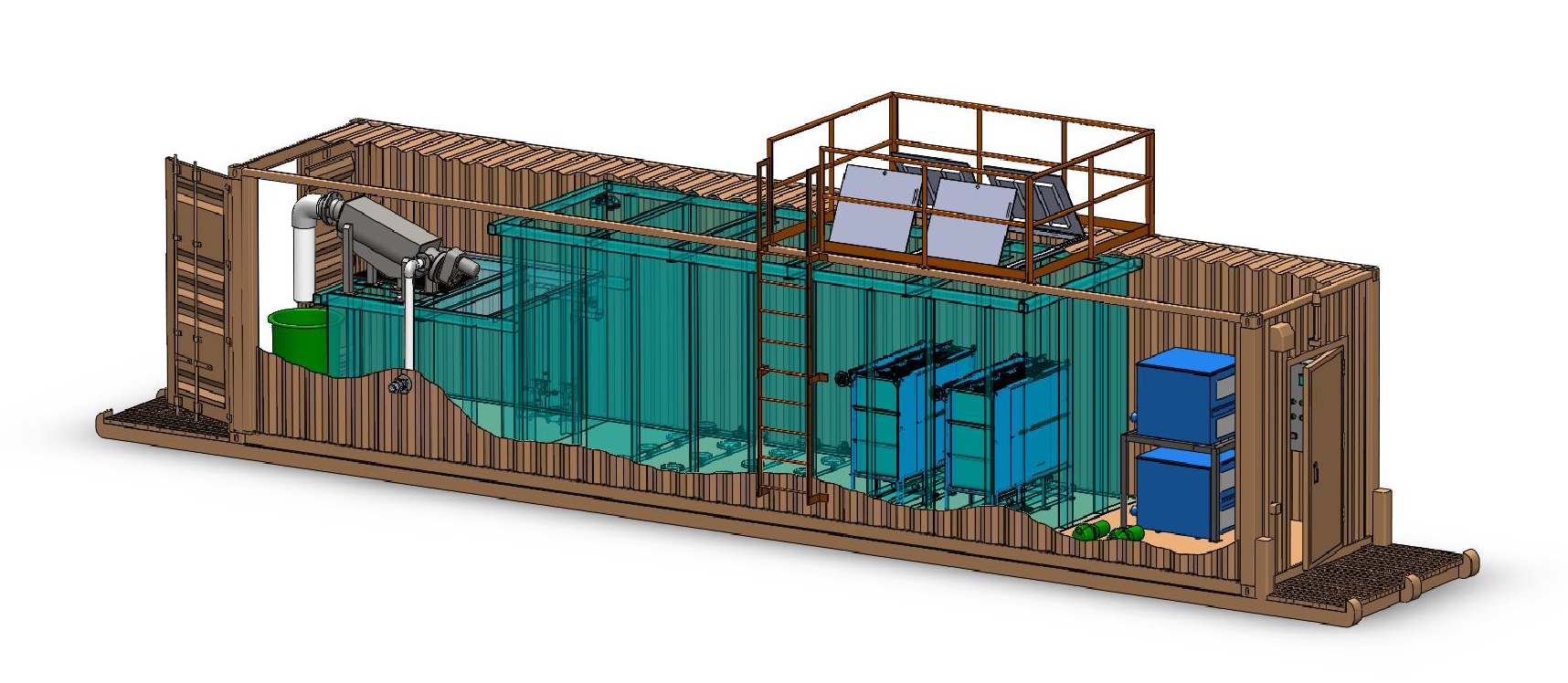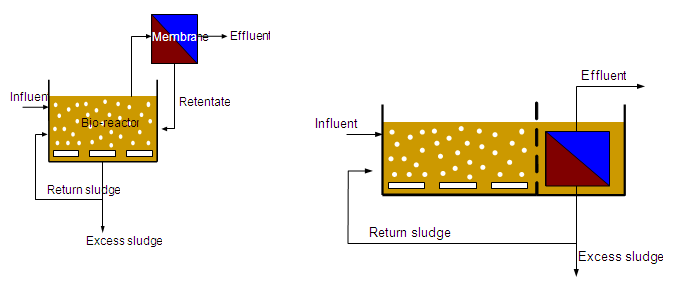How Membrane Bioreactor Technology Is Revolutionizing Wastewater Treatment
Wiki Article
The Advantages of Membrane Bioreactors in Sustainable Wastewater Administration
Membrane bioreactors (MBRs) represent a critical development in lasting wastewater administration, efficiently merging biological therapy with advanced membrane purification modern technology. As the need for sustainable solutions escalates, discovering the diverse benefits of MBRs might expose unexpected implications for the future of wastewater therapy systems.Summary of Membrane Layer Bioreactors
Membrane layer bioreactors (MBRs) stand for a substantial improvement in wastewater treatment innovation, integrating organic destruction with membrane purification to enhance the performance of the therapy process. This cutting-edge system combines the advantages of conventional turned on sludge procedures with membrane layer innovation, permitting improved solid-liquid splitting up. MBRs utilize semi-permeable membranes to separate cured water from biomass, leading to high-grade effluent that can be recycled or securely discharged into the environment.The functional style of MBRs commonly involves a bioreactor where microorganisms damage down raw material, adhered to by a membrane unit that filterings system the combined liquor. This configuration not only lessens the impact of the therapy center but likewise enables for greater biomass focus and minimized hydraulic retention times. Additionally, MBRs can treating a broader range of pollutants, consisting of pathogens and nutrients, making them suitable for different applications, from metropolitan wastewater treatment to industrial effluent processing.
The combination of MBRs into wastewater administration systems is a sign of an expanding trend in the direction of reliable and sustainable methods in environmental engineering. Their ability to produce premium effluent while minimizing room needs placements MBR modern technology as an essential player in contemporary wastewater treatment solutions.
Boosted Effluent Quality

The membrane layer filtering process serves as a physical obstacle, allowing the retention of microorganisms and particle matter, which adds to a more clear and cleaner effluent (Membrane Bioreactor). Moreover, MBRs operate at greater biomass focus than standard turned on sludge systems, promoting more effective biodegradation of pollutants. This leads to a decrease in biochemical oxygen demand (FIGURE) and complete suspended solids (TSS) degrees in the final effluent
In addition, MBRs demonstrate excellent efficiency in treating tough wastewater structures, such as commercial effluents and wastewater with high nutrient loads. Because of this, the effluent produced is typically of better, permitting more versatile disposal choices and lowered environmental impact. Ultimately, the improved effluent top quality accomplished through MBR technology highlights its crucial role in advancing sustainable wastewater administration methods.
Water Reuse Opportunities
The high-quality effluent produced by membrane layer bioreactors (MBRs) opens significant possibilities for water reuse in numerous applications. MBRs successfully eliminate impurities, consisting of pathogens, suspended solids, and organic matter, resulting in cured water that satisfies or goes beyond governing requirements for reuse. This high quality permits for the implementation of water recycling efforts across diverse industries.One famous application remains in farming, where treated wastewater can be used for watering, advertising lasting farming methods while preserving freshwater resources. Furthermore, MBR-treated effluent can be why not try this out utilized for industrial processes such as air conditioning, cleansing, and as a procedure water resource, significantly reducing the demand for safe and clean water in these procedures.
In city settings, MBRs promote using reclaimed water for landscape irrigation, toilet flushing, and other non-potable usages, adding to the overall durability of supply of water systems. The assimilation of MBR innovation see this in decentralized systems help in managing local water demands, particularly in water-scarce areas.
Lowered Ecological Effect
Exactly how can the adoption of membrane layer bioreactors (MBRs) add to a minimized ecological influence in wastewater administration? MBRs substantially improve the treatment performance of wastewater while decreasing eco-friendly disruptions. By integrating organic treatment procedures with membrane purification, MBRs successfully eliminate a large range of toxins, including raw material, nutrients, and pathogens. This innovative purification causes higher-quality effluent, which is important for protecting water ecosystems and decreasing the problem on natural water bodies.Furthermore, MBRs operate at reduced hydraulic retention times contrasted to standard systems, resulting in smaller therapy plant footprints. This compact design reduces land use, thus protecting all-natural habitats and biodiversity. The process additionally produces much less sludge than conventional methods, mitigating disposal difficulties and reducing greenhouse gas emissions associated with sludge administration.
Furthermore, MBRs promote the recovery of important sources, such as water and nutrients, contributing to a round economy. By allowing water reuse for watering or commercial procedures, MBRs help reduce freshwater deficiency, thus promoting lasting water make use of practices. Eventually, the fostering of MBR technology represents a considerable stride in the direction of reducing the environmental impact of wastewater management systems.
Financial Advantages of MBRs

Furthermore, MBRs facilitate the manufacturing of high-grade effluent, which can be recycled for different applications, such as agricultural watering and commercial procedures - Membrane Bioreactor. This reuse capability can considerably decrease water purchase expenses, offering an economic news incentive for sectors encountering stringent water guidelines
The compact style of MBR systems also results in minimized land needs, which is specifically important in urban locations where property is costly. By lessening space, districts and markets can minimize land procurement and maintenance expenditures.
Additionally, MBRs commonly require less frequent upkeep and have a longer lifespan than typical systems, additionally adding to cost financial savings. In recap, the economic advantages of MBRs-- varying from decreased functional costs to land financial savings and effluent reuse-- make them a compelling choice for lasting wastewater administration, offering both instant and long-term financial benefits.
Final Thought
Membrane bioreactors represent a transformative method to lasting wastewater management, integrating organic treatment with innovative membrane layer purification for exceptional effluent quality. Their capability for efficient pollutant removal assists in water reuse, consequently saving essential freshwater sources. In addition, MBRs add to lowered environmental impacts via portable styles and lower sludge generation. Economic advantages even more improve their practicality, making MBRs a promising service for addressing the obstacles of wastewater therapy and advertising lasting source administration.
Membrane bioreactors (MBRs) represent a pivotal innovation in lasting wastewater monitoring, successfully merging organic therapy with sophisticated membrane layer filtration innovation.Membrane bioreactors (MBRs) stand for a considerable advancement in wastewater treatment modern technology, integrating organic degradation with membrane filtration to boost the efficiency of the therapy procedure.Achieving enhanced effluent top quality is one of the most significant advantages of making use of membrane bioreactors (MBRs) in wastewater therapy.Furthermore, MBRs show outstanding efficiency in dealing with challenging wastewater compositions, such as industrial effluents and wastewater with high nutrient lots.Integrating membrane bioreactors (MBRs) into wastewater administration not only lowers environmental effect yet additionally presents considerable economic benefits.
Report this wiki page